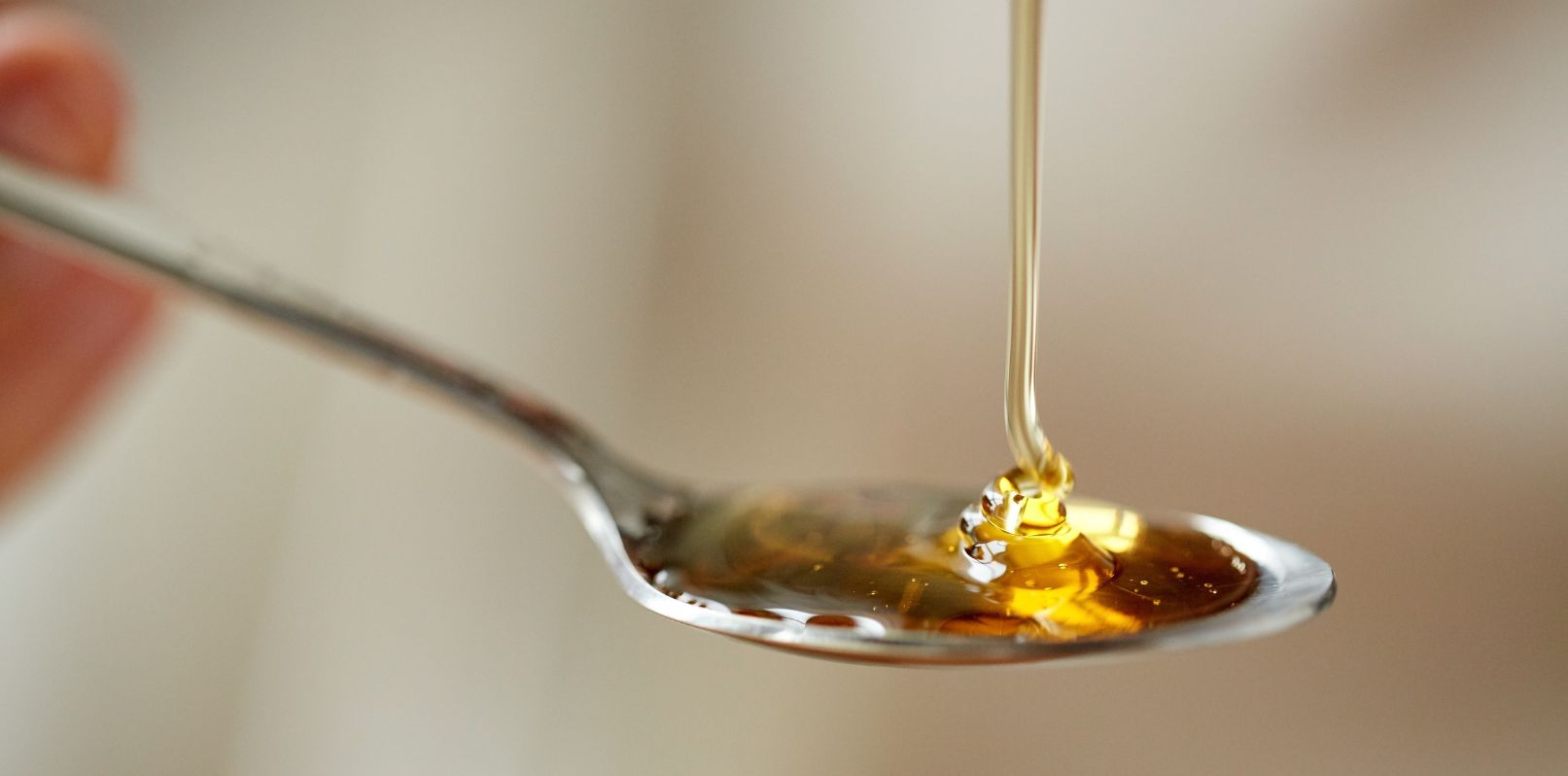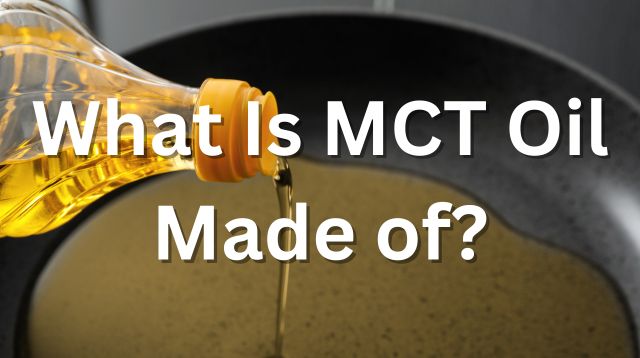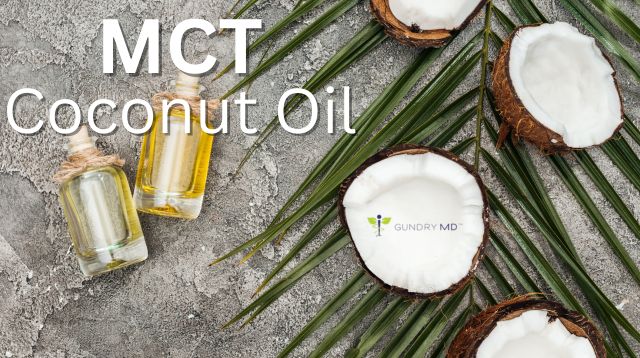What is MCT Oil and What Does it Do?

What Is MCT Oil?
MCT oil stands for medium-chain triglyceride oil. It’s a type of dietary fat composed of medium-chain fatty acids (MCFAs). MCFAs are a specific type of fatty acid that has a shorter carbon chain length compared to long-chain fatty acids found in many other fats and oils.
MCT oil is typically derived from coconut oil or palm kernel oil. It mostly contains the MCFAs of caprylic acid (C8) and capric acid (C10). These MCFAs are known for their unique properties and are quickly absorbed by the body into the bloodstream, providing a readily available energy source.1

So, what is MCT oil made of?
MCT oil is primarily made from coconut or palm kernel oil through a process called fractionation, which separates the medium-chain triglycerides (MCTs) from other fats and compounds present.
The composition of MCT oil can vary, but it typically consists of a blend of caprylic acid (C8) and capric acid (C10). The other two MCFAs commonly found in basic coconut oil – lauric acid (C12) and caproic acid (C6) – are usually removed, or used in small quantities, to enhance the quality of MCT oil.2
MCT powder (where the MCTs are processed into a powder form) is often seen as a more convenient form of MCT oil.
What Are The Potential Health Benefits Of MCT Oil?
Not all fats are created equal.
What we typically view as healthy fats are monounsaturated and polyunsaturated fats. These fats include the famed omega-3 fats found in oily fish, avocados, walnuts, almonds, chia and flax seeds, olive oil, and avocado oil.3
Less healthy fats are known as saturated fats and trans fats.MCT is unique in the classification process. It’s technically a saturated fat but appears to behave differently than long-chain saturated fats. Instead, MCTs have shown potentially beneficial health effects.4
You can explore more MCT Oil Nutrition Facts here.
So, what are the potential health benefits of MCT Oil?
1. MCTs May Help Support Energy And Focus
Though more studies are necessary, MCT oil may potentially be beneficial as an instant source of energy because it’s so easily absorbed into the bloodstream.5
MCTs are also converted into ketones in the liver, so they may provide better, more efficient energy for the brain, potentially helping to support focus and concentration.6
2. MCTs May Help Support Weight Loss Goals
MCT oil has gained far more attention for its potential to promote weight loss. Research suggests that consuming MCT oil may lead to greater energy expenditure, and therefore be useful in weight management.7
When MCT coconut oils are consumed, they also have a high burn rate in the body. This may help boost the number of calories burned after meals, a process known as post-meal thermogenesis. Studies have shown that meals containing MCTs can enhance post-meal thermogenesis in both lean and obese individuals.8
In one study, those following a calorie-restricted diet were told to consume 5 teaspoons of MCT oil or 5 teaspoons of olive oil each day. After 16 weeks, those in the MCT group lost about 3.5 pounds more and saw greater reductions in body fat.9
If you’re wondering how to use MCT oil to support weight loss goals, it can be done more effectively by following a few key steps.

3. MCTs May Help Support Healthy Blood Sugar Levels
One of the benefits of MCT oil is that it may make it easier to keep blood sugar at safe levels.
This could have a big impact on how people keep healthy blood sugar levels in check. As MCT may also have an impact on weight management, it could be helpful for people with weight loss goals as part of a healthy diet.10
4. MCTs May Help Support Brain Function
MCT oil may have significant potential benefits for brain function.
MCT oil stimulates the production of ketones, highly efficient energy sources for the brain. Ketones have shown an ability to help support cognitive function and brain health in both older and younger adults.11,12
MCT oil has shown some potential neuroprotective properties, which might help promote overall brain health.13

MCT Oil FAQs
What Is MCT Oil Used For?
MCT oil is a versatile dietary supplement because it offers such a range of potential health benefits. It can also be used in a variety of different ways. Let’s explore: what is MCT oil used for?
What’s The Difference Between MCT Oil And Coconut Oil?
Which is better? Well, MCT oil and coconut oil differ significantly in terms of their composition and potential health benefits. For example, MCT oil contains 100% MCTs, while coconut oil contains only around 50% MCTs.14
Learn more about the key differences between MCT Oil and Coconut Oil.
Should I Choose MCT Oil Or MCT Powder?
When it comes to MCT Powder Vs MCT Oil, the powder form is simply MCT oil that’s been transformed through a process called spray drying.
In recent years, MCT oil powder has also become popular as a convenient source of MCTs. The powder is made by drying MCT oil and is often combined with other potent ingredients.
MCT powder may come with extra health benefits depending on the additional ingredients used in its formulation.15
It’s important to choose a high-quality MCT powder to ensure maximum potential benefits.What’s The Difference Between MCT Oil C8 And MCT Oil C10?
Sometimes, you’ll find different formulations of MCT oil which vary in their composition of MCT C8 (caprylic acid) and C10 (capric acid). Learn more about MCT Oil C8 Vs C10.
Should I Switch Olive Oil For MCT Oil?
When it comes to MCT Oil Vs Olive Oil, both oils offer unique potential health benefits when incorporated into a balanced diet. So, one should not be “replaced” by the other.
MCT oil is primarily composed of medium-chain fatty acids and is known as a quick energy source, while olive oil is rich in monounsaturated fatty acids and antioxidants, offering heart-healthy benefits.16 They also have very different flavors and cooking capabilities.
How Do Omega-3 Fatty Acids Compare To MCTs?
Omega-3 fatty acids are a group of polyunsaturated fatty acids. Omega-3 is commonly known as “fish oil,” as it’s obtained from fatty fish, like salmon, mackerel, and sardines. However, omega-3s are also found in vegetable oils and nuts (especially walnuts), flax seeds and flaxseed oil, and leafy vegetables.17
In terms of potential health benefits, both MCT oil and omega-3 have shown positive effects on the body. Read more about MCT Oil Vs Omega-3.
What About Avocado Oil?
MCT and avocado oil are both popular choices in health and wellness due to their numerous potential benefits and versatility. But, they are used quite differently. For example, avocado is a wonderful choice when it comes to cooking or as a dressing for salads and vegetables.
MCT Oil Vs Butter For Your Coffee
Adding fat to coffee has become a popular practice, with two common options being MCT oil and butter. When the two are combined in coffee, this is commonly termed a “bulletproof coffee.”
Now, both MCT oil and butter may provide additional brain energy and a creamier consistency to coffee, but they have some key differences in terms of their source, composition, flavor, and potential health benefits. So, it can help to be better informed about MCT oil vs butter for your coffee.
Can You Cook With MCT Oil?
One common question that arises is whether you can cook with MCT oil.
MCT oil has a low smoke point, similar to oils like flaxseed oil, wheat germ oil, and walnut oil. This means it doesn’t respond well to high heat. So, if you would like to cook with it, you should not expose MCT oil to temperatures above 302F.18
How Do I Use MCT Oil In Coffee?
When combined, MCT oil in your morning coffee may provide an extra boost of brain energy while creating a creamy, indulgent texture. There are several ways to enjoy MCT oil in coffee – one popular way is by making a “butter coffee.”
Can I Put MCT Oil In My Protein Shake?
Protein shakes have become increasingly popular among athletes, fitness enthusiasts, and those seeking to supplement their protein intake. Just as with coffee, you may incorporate MCT oil in protein shakes for a host of potential health benefits.
Does MCT Oil Work in Tea?
MCT oil can be added to any beverage, including hot tea. Simply add the desired amount of MCT oil to your tea, and stir well to incorporate it. Read more about MCT oil in tea.
Are There Potential Topical Benefits Of Using MCT Oil On The Skin?
MCT oil is commonly used as a dietary supplement, but it’s also gained popularity as a topical ingredient for skincare. While research on the specific potential benefits of using it on the skin is limited, there may be some potential advantages of MCT oil for skin.
Sources
- https://www.health.harvard.edu/blog/is-there-a-place-for-coconut-oil-in-a-healthy-diet-2019011415764
- https://www.healthline.com/nutrition/mct-oil-101#mct-oil
- https://ods.od.nih.gov/factsheets/Omega3FattyAcids-Consumer/
- https://pubmed.ncbi.nlm.nih.gov/26727347/
- https://link.springer.com/article/10.1007/s13197-022-05499-w
- https://www.ncbi.nlm.nih.gov/pmc/articles/PMC4669977/
- https://pubmed.ncbi.nlm.nih.gov/2021124/
- https://pubmed.ncbi.nlm.nih.gov/2021124/
- https://pubmed.ncbi.nlm.nih.gov/18326600/
- https://pubmed.ncbi.nlm.nih.gov/1568535/
- https://alz-journals.onlinelibrary.wiley.com/doi/abs/10.1002/alz.055702
- https://pubmed.ncbi.nlm.nih.gov/33220329/
- https://www.frontiersin.org/articles/10.3389/fneur.2023.1123290/full
- https://www.ncbi.nlm.nih.gov/pmc/articles/PMC4882694/
- https://aapharmachem.com/mct-oil-and-oil-powder/
- https://www.health.harvard.edu/nutrition/is-extra-virgin-olive-oil-extra-healthy
- https://www.hsph.harvard.edu/nutritionsource/what-should-you-eat/fats-and-cholesterol/types-of-fat/omega-3-fats/
- https://med.virginia.edu/ginutrition/wp-content/uploads/sites/199/2014/06/Parrish-February-17.pdf
Related posts


